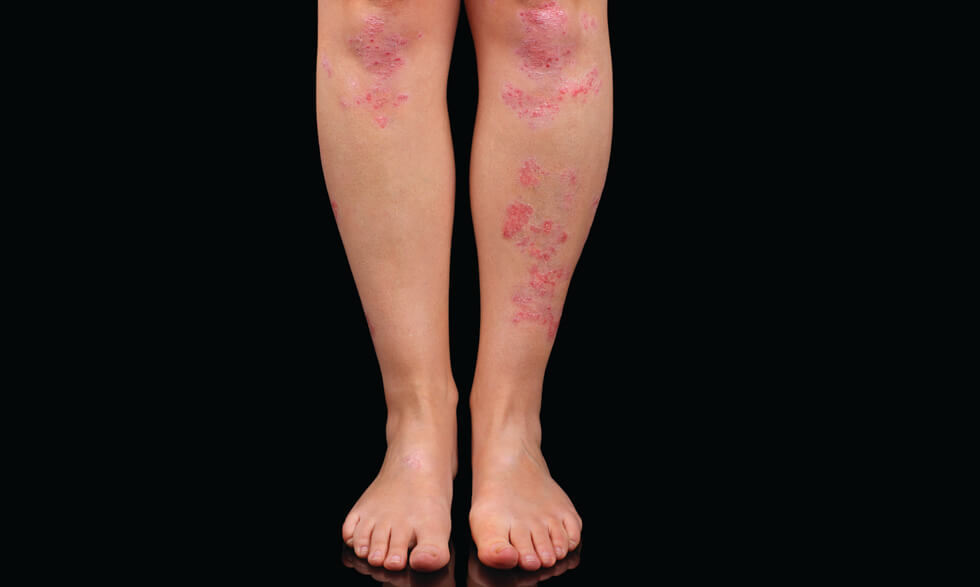
Psoriasis is a chronic (long-lasting) skin disease of scaling and inflammation that affects more than three percent of the U.S. population.
Although the disease occurs in all ages, it mostly affects adults. It appears about equally in males and females.
Psoriasis occurs when skin cells quickly rise from below the surface of the skin and pile up on the surface before they can mature. Usually this process (also called turnover) takes about a month, but in psoriasis it may occur in only a few days.
In its typical form, psoriasis results in patches of thick, red (inflamed) skin covered with silvery scales. These patches, which are sometimes referred to as plaques, are usually itchy or sore. Plaques often occur on the elbows, knees, other parts of the legs, scalp, lower back, face, palms, and soles of the feet. But they can occur on skin anywhere on the body.
How does psoriasis affect quality of life?
People with psoriasis may experience significant physical discomfort and some disability. Itching and pain can interfere with basic functions, such as caring for oneself, walking, and sleeping. Plaques on hands and feet can make it difficult to work in certain physical occupations, play some sports, and care for family members. People with moderate to severe psoriasis may also feel self-conscious about their appearance.
How is psoriasis diagnosed?
Because psoriasis can resemble other skin diseases, doctors sometimes find it difficult to diagnose it. Health care providers may need to use a microscope to examine a small skin sample before confirming a diagnosis.
In many cases, there is a family history of psoriasis. Researchers who have studied a large number of families affected by psoriasis have identified genes linked to the disease.
People with psoriasis may notice times when their skin worsens, called flares, before improving. Infections, stress, and weather changes can cause flares. Also, certain medicines may trigger an outbreak or worsen the disease.
How is psoriasis treated?
Doctors generally treat psoriasis in steps based on the severity of the disease, size of the areas involved, type of psoriasis, and where the psoriasis is located. Options can include:
- Medicines applied to the skin (topical treatment)
- Light treatment (phototherapy)
- Medicines by mouth or injection (systemic therapy)
Over time, affected skin can become resistant to treatment, especially when topical corticosteroids are used. Also, a treatment that works well in one person may have little effect in another. Thus, doctors often use a trial-and-error approach to find an option that works.
Topical Treatment
Treatments applied directly to the skin may improve the condition. Doctors find that some patients respond well to ointment or cream forms of corticosteroids, vitamin D3, retinoids, coal tar, or anthralin. Bath solutions and lubricants may be soothing, but they are seldom strong enough to improve the condition of the skin. Therefore, they usually are combined with stronger remedies.
Light Therapy
Natural ultraviolet (UV) light from the sun and controlled delivery of artificial UV light are used to treat psoriasis. It is important that a doctor administers light therapy. Spending too much time in the sun or a tanning bed can cause skin damage, increase the risk of skin cancer, and worsen symptoms.
Systemic Treatment
For more severe forms of psoriasis, doctors sometimes prescribe medicines that are taken by pill or injection.
- Cyclosporine. Taken orally, cyclosporine acts by suppressing the immune system to slow the rapid turnover of skin cells. It may provide a quick relief of symptoms, but the improvement stops when treatment is discontinued. Cyclosporine may impair kidney function or cause high blood pressure (hypertension). Therefore, a doctor’s supervision is important.
- Methotrexate. Like cyclosporine, methotrexate suppresses the immune system to slow cell turnover. It can be taken by pill or injection. Patients taking methotrexate must be closely monitored because it can cause liver damage and decrease the production of oxygen-carrying red blood cells, infection-fighting white blood cells, and clot-enhancing platelets.
- Retinoids. Oral retinoids are compounds with vitamin A-like properties that may be prescribed for severe cases of psoriasis that do not respond to other therapies. Because these medications may cause birth defects, women must consult with their health-care provider if they plan to become pregnant.
- Biologics. Biologics are made from proteins produced by living cells instead of chemicals. They interfere with specific immune system processes, which cause the overproduction of skin cells and inflammation. These drugs are injected (sometimes by the patient). Patients need their doctors to carefully monitor these treatments.
- PDE4 inhibitors. Taken orally, phosphodiesterase 4 (PDE4) inhibitors target molecules inside immune cells to suppress the rapid turnover of skin cells and inflammation.
Combination Therapy
Combining various topical, light, and systemic treatments often permits lower doses of each and can result in greater improvements.
There are many approaches for treating psoriasis. Ask your doctor about the best options for you.
